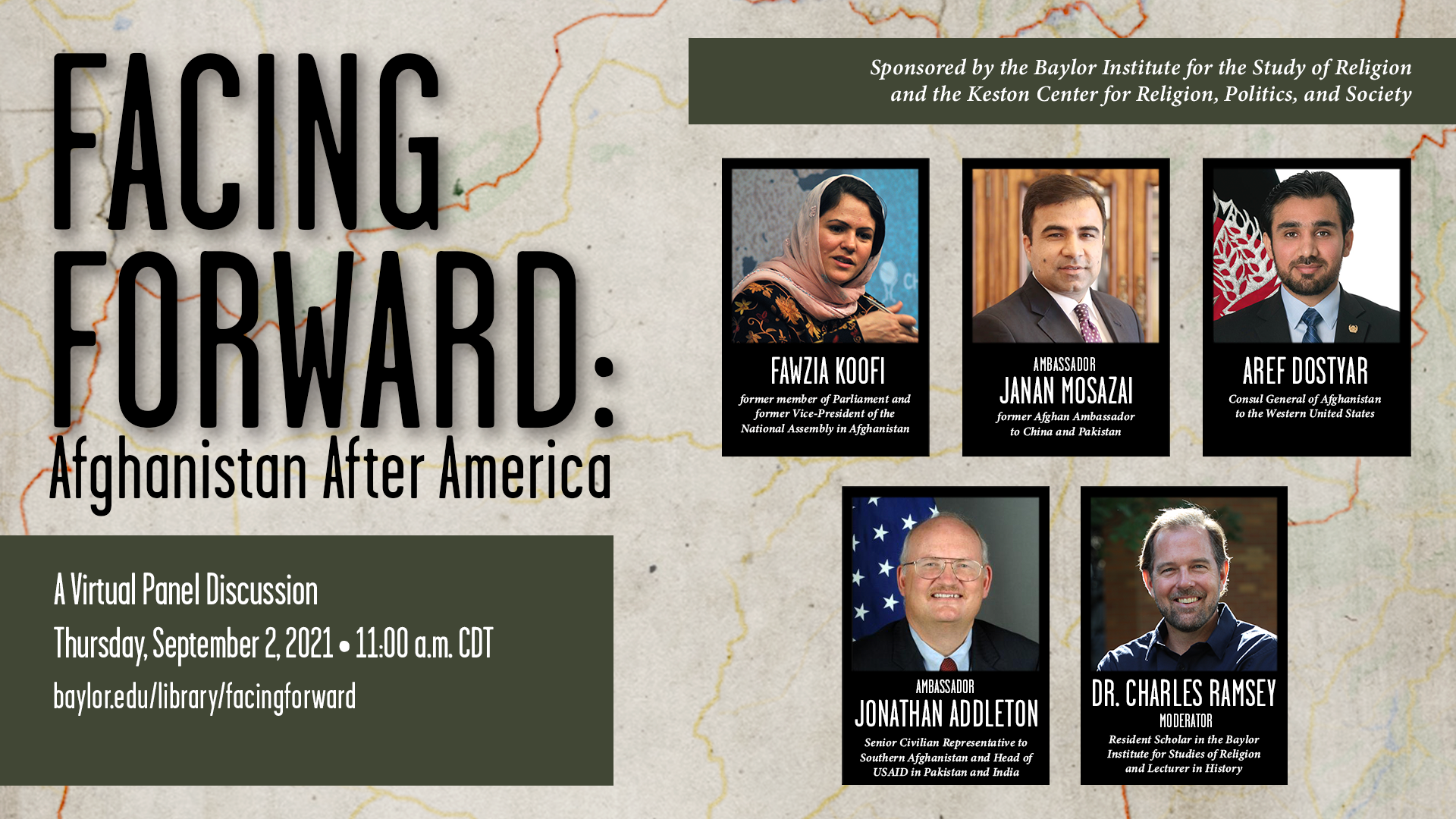Fawzia Koofi Headlines Virtual Panel on the Future of Afghanistan After America

Baylor Institute for Studies of Religion and Keston Center for Religion, Politics and Society present "Facing Forward: Afghanistan After America," a panel presentation and conversation hosted on Zoom on Thursday, Sept. 2, 2021, at 11 a.m. CT.
Libraries and ITS Contact: Carl Flynn, Baylor Libraries and ITS
Follow Baylor Media and Public Relations on Twitter: @BaylorUMedia
WACO, Texas (Aug. 31, 2021) – Baylor University’s Institute for Studies of Religion and Keston Center for Religion, Politics and Society will host "Facing Forward: Afghanistan After America," an expert panel of former Afghan leaders and diplomacy experts during a Zoom webinar at 11 a.m. CT Thursday, Sept. 2, 2021.
Free and open to the public, the panel will explore the events that have unfolded in Afghanistan over the past few weeks with a view toward the future of this historically tumultuous region. Attendees can obtain Zoom webinar credentials for the panel discussion and additional information at baylor.edu/library/facingforward.
Panelists include:
• Fawzia Koofi, former member of Parliament in Kabul, former vice president of the National Assembly in Afghanistan, current member of the Afghan delegation negotiating peace with the Taliban, women's rights activist and author of "The Favored Daughter: One Woman's Fight to Lead Afghanistan into the Future" (2013).
• Ambassador Janan Mosazai, former Afghan ambassador to China and Pakistan, former spokesman and director general of communications for the Ministry of Foreign Affairs of Afghanistan and co-founder and executive committee representative for the Heart of Asia Society.
• Aref Dostyar, consul general of Afghanistan to the western United States, former director general of international relations and regional cooperation and former director of peace and reconciliation affairs at the Office of the National Security Council.
• Ambassador Jonathan Addleton, senior civilian representative to southern Afghanistan, head of USAID in Pakistan and India, current rector of Forman Christian College in Pakistan and author of "The Dust of Kandahar: A Diplomat Among Warriors in Afghanistan" (2016).
Charles Ramsey, Ph.D., resident scholar in the Baylor Institute for Studies of Religion and lecturer in Baylor’s department of history, will moderate the conversation. Ramsey was a 2019 Keston summer teaching fellow and previously taught at Forman Christian College in Pakistan as an assistant professor of religion and public policy.
"For several years I've tried to get my friend Aref Dostyar to come to Baylor to speak about Afghanistan," Ramsey said. "With events unfolding so rapidly in the region, it made sense to coordinate this panel to help contextualize news reports being received from around the world."
Each of the panelists brings unique insight into the current events in Afghanistan based on their work in the region. Working from the office of President Ashraf Ghani, Dostyar was instrumental in drafting the initial framework for the peace process, and he has brought together key leaders from inside the Afghan government for this panel who have watched the looming deadline of US withdrawal with grave concern.
Fawzia Koofi, a senior government leader and one of the only female negotiators on the Afghan team, has engaged in deliberations with the Taliban leadership for over a year. Speaking from inside Afghanistan, Koofi is at the tip of the spear, and she has a keen understanding of what is at stake for the nation, and also for the women of Afghanistan. Courageous, capable and insightful, Koofi, perhaps more than anyone else today, is the voice for the voiceless, speaking for the women of Afghanistan.
Ambassador Mosazai has been instrumental in building robust relations with Afghanistan’s regional neighbors, China and Pakistan, and he offers the seasoned perspective of one who has been at the negotiating table all along. He alerted others to the deteriorating situations and sounded the alarm on multiple occasions, attempting to prevent the disaster now seen unfolding in Kabul. A world class strategist, Mosazai had the foresight to strengthen diplomatic lifelines that are proving vital today. This has positioned his think tank, the Heart of Asia Society, as one of the very few non-Taliban representatives of the Afghan people.
Ambassador Jonathan Addleton is a career U.S. diplomat who provides unparalleled context for the crisis in Afghanistan and its importance in global affairs. A true regional specialist, Addleton was at the intersection of the State Department and U.S. Military in the heart of the Taliban homeland. He has walked through the lowliest villages meeting with tribal leaders and local authorities, and also through the highest corridors of power. Addleton provides a more nuanced and professional commentary on the U.S. involvement in Afghanistan and its consequences in the surrounding region.
Keston Center director Kathy Hillman has long desired to work with Baylor’s Institute for Studies of Religion on such an event.
"The Keston Center for Religion, Politics and Society partners with the Keston Institute in the UK to carry on the legacy of being the 'voice of the voiceless' by making available materials about religious suppression under totalitarian regimes,” Hillman said. “Keston's archive at Baylor draws leading scholars who write and reflect on religious persecution and, among other resources, contains a small collection related to Afghanistan.”
ABOUT BAYLOR UNIVERSITY
Baylor University is a private Christian University and a nationally ranked research institution. The University provides a vibrant campus community for more than 19,000 students by blending interdisciplinary research with an international reputation for educational excellence and a faculty commitment to teaching and scholarship. Chartered in 1845 by the Republic of Texas through the efforts of Baptist pioneers, Baylor is the oldest continually operating University in Texas. Located in Waco, Baylor welcomes students from all 50 states and more than 90 countries to study a broad range of degrees among its 12 nationally recognized academic divisions.